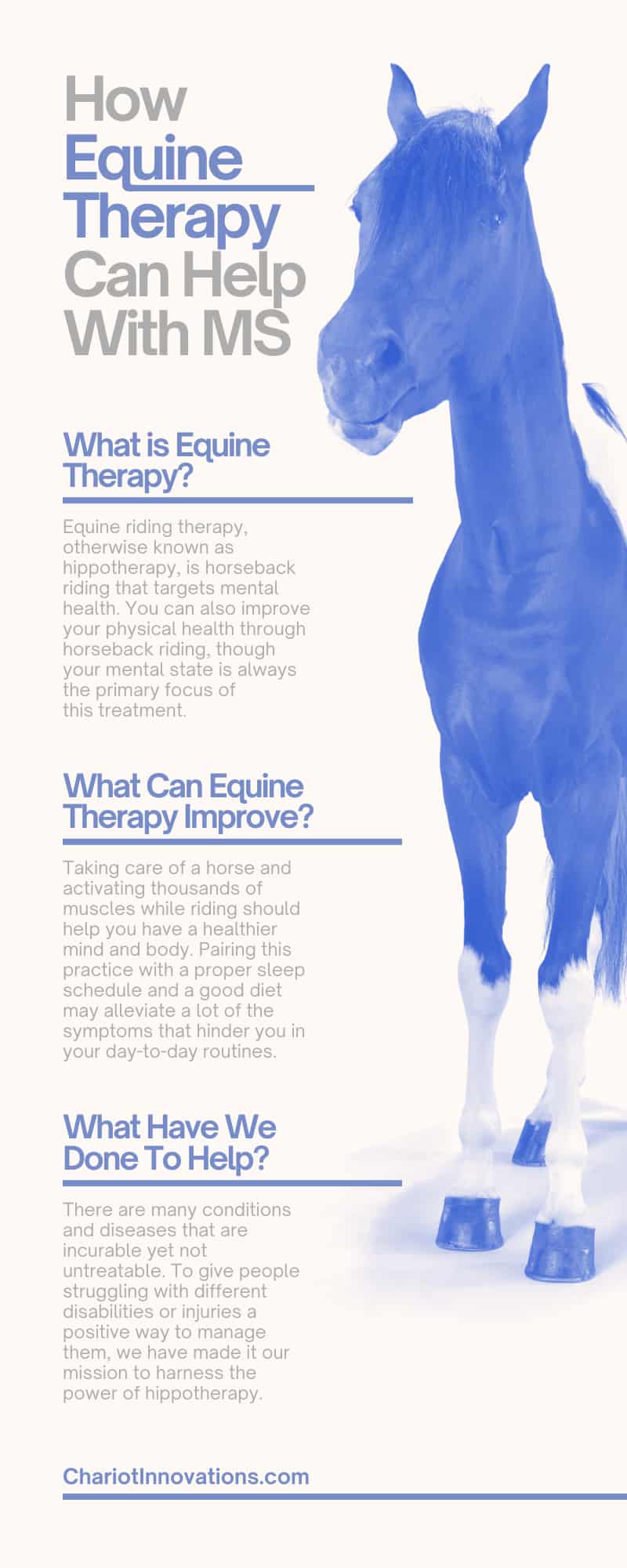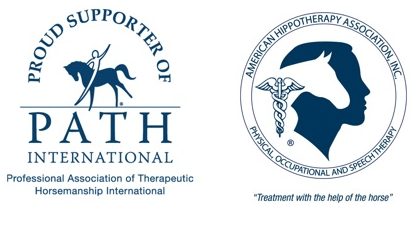How Equine Therapy Can Help With MS
It can be difficult to know where to begin when you receive an MS diagnosis. It’s natural to have an infinite number of thoughts passing through your brain. By understanding your diagnosis, you can take strides toward keeping symptoms at bay and maintaining the abilities you have. One way to do so is with hippotherapy for MS. To explore this idea further, keep reading to learn how equine therapy can help with MS.
What Is MS?
Multiple sclerosis is an autoimmune disease. It compromises the immune system we rely on to protect us from illness and fight diseases. The immune system begins attacking tissues rather than defending them. This occurrence destroys the fatty coating that protects our brain and spinal cord nerve fibers. With the elimination of this important protective layer, nerves end up exposed and vulnerable. Horse therapy for MS aims to excite the brain to make it stronger.
What Does It Affect?
MS affects many parts of the body and causes chronic pain and fatigue. It can affect the eyes and cause double vision or complete vision loss. MS can impair coordination of body movements, affecting a person’s ability to walk, move, or complete tasks. The severity of the chronic symptoms will vary from person to person. While one individual may experience very few symptoms throughout their life, another may experience acute and unwavering pain and disability. Equine therapy for MS can help relieve a range of symptoms caused by the disorder.
Back
The back’s muscle strength may diminish, causing slumping, posture issues, and an inability to remain upright. Vision problems or eye pain that makes a person nod or have trouble maintaining posture can also lead to back injuries.
Muscles
Our muscle groups all connect to one another, so an issue in one area can greatly affect another. A person with MS could experience a myriad of problems, such as cramping, a changed walking gait, and trouble changing their motions. It’s also possible to experience muscle paralysis, stiffness, and weakness. In some cases, movements may exaggerate, or involuntary movements may occur due to spasms or overactive reflex responses.
Balance
Those with MS may find that tremors occur in their hands and other extremities when attempting specific movements. This can cause falling or instability. Additionally, vertigo, body fatigue, and dizziness may hinder sitting, standing, and moving without support. MS can decrease muscle strength quickly, so strength is something that a person with MS must actively maintain.
Urinary Tract
We often forget that our control over our bladders comes from muscle control. If a person loses strength, it may be difficult to retain urine. Moreover, the urge to use the restroom may occur more frequently. This may be especially true in the evening hours when a person with MS is attempting to rest. As we lay down, certain bodily demands can sometimes become more prominent because our minds are free of distractions.
Mood
Constant pain or weakness is enough to make anyone ornery. Therefore, it isn’t uncommon to experience increased anxiety as you work through the unknowns and what-ifs of MS. Anxiety tends to go hand-in-hand with depression as well. Both can cause mood swings and instances where you cycle through the stages of grief. Even if you are having trouble accepting your diagnosis, be sure to accept your feelings as valid and natural. Then, you can take steps to work through those darker moments with a professional. Especially if you love animals, equine therapy for MS can help improve your mood.
Speech
We owe our speaking abilities to several different muscles. If you’re experiencing trouble with your brain’s nerves, it’s natural to develop issues with speech. Symptoms of progressive MS can thus include slurred speech or an inability to fully control the mouth’s muscles.
What is Equine Therapy?
Equine riding therapy, otherwise known as hippotherapy, is horseback riding that targets mental health. You can also improve your physical health through equestrian therapy for MS, though your mental state is always the primary focus of this treatment. The strength and balance that you build with hippotherapy can enhance your quality of life. It can do this by helping you maintain a feeling of independence, aiding you in staving off fatigue and spasticity, and improving your mood.
Caring for the horse also creates a bond and demands communication between the animal and the rider. This time is therapeutic for both parties. It allows the individual with MS to look outside themselves and address the needs of the horse, who will in turn address and aid in the needs of the rider. Horse therapy for MS also stimulates the brain, which helps with function and control. Moreover, a person can practice speaking by giving the horse commands.
What Can Equine Therapy for MS Improve?
As touched on, strengthening muscles and maintaining balance, mobility, and other physical abilities can help with attitude. Though there isn’t a cure for MS, the equine therapy approach can make life easier. Focusing on what you can’t do will keep you in a dark place, so the positivity you can develop with hippotherapy for MS is invaluable.
Taking care of a horse and activating thousands of muscles while riding should help you have a healthier mind and body. Pairing this practice with a proper sleep schedule and a good diet may alleviate a lot of the symptoms that hinder you in your day-to-day routines.
What Have We Done To Help?
We at Chariot Innovations have taken great care to fully understand the benefits associated with horseback riding therapy. There are many conditions and diseases that are incurable yet not untreatable. To give people struggling with different disabilities or injuries a positive way to manage them, we have made it our mission to harness the power of hippotherapy.
With the MiraColt riding technology, people with many different levels of capability can experience the walking gait of a horse and use it for therapy. Simultaneous use of thousands of muscles while riding can help support the needs of many. We think that the implementation of such therapy improves quality of life and offers a sense of freedom to those maintaining and developing their muscles.
If you have additional questions about how equine therapy for MS can help, consult your physician and feel free to ask the professionals at Chariot Innovations. Our continued aim is to offer information about the various ways equine riding therapy can help those who struggle with specific disorders, conditions, and diseases. The more you know, the better you’ll be able to seek the assistance you need.

